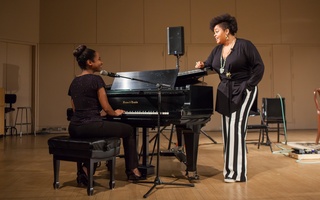{shortcode-f39c7a603b837128367d74f9ef38970c92cc9e71}As I waited for my mom to answer the phone, I practiced several different ways to tell her that I was dying.
Ring.
“Tengo algo que decirte…”
Ring.
“Espero que algún día puedas entender…”
Ring.
“I’m really sorry that it has to be this way.”
No answer. She must still be on her shift at McDonald’s, I figured. Students made their way on and off the subway train as we left Metro Center Station. I thought of my mother’s stories of commuting to and from school in camionetas back home. As the last of the students trickled in, my attention shifted away from the subway car.
***
Clutching the knife that she kept hidden in her pocket, Esperanza kept her head down and made her way onto the bus. The bright red and yellow colors of the camioneta, one of the retired American school buses which her country used for public transportation, danced vibrantly behind her against the poorly lit city streets. As she boarded, she stopped to examine the monstrous vehicle which would eventually take her home. “Dios es Amor” had been painted on the side of the camioneta in bright red, in hopes that the words would keep the bus’s driver safe. To Esperanza, however, the phrase looked like it had been written in blood.
A chill ran down her spine as she handed 50 centavos to the bus driver. Spotting an open seat next to an elderly woman carrying a pack of tortillas on her lap, Esperanza made her way towards the center of the bus. She shot the woman a brief smile as she sat down, and pulled out a notebook, a pencil, and a second-hand textbook — Dennis M. Ritchie’s “The C Programing Language, Second Edition”— from her bag.
“Notice that the type being declared in a typedef appears in the position of a variable name, not right after the word typedef. Syntactically, typedef is like the storage classes extern, static, etc.”
Esperanza underlined the word “syntactically.” She paused for a moment, holding the tip of the pencil between lips, and then wrote its Spanish equivalent in the margins of her textbook: sintácticamente. In her notebook, she painstakingly began to write out each line of code from the unit’s exercises.
“This would be so much easier if I had a computer,” Esperanza reminded herself. Eyeing the stich marks on the back of her left heel, she sighed and continued. Esperanza flipped through her notebook and smiled to herself as she finished, satisfied that she had managed to complete most of the assignment during her after school job as a secretary in her university’s administrative center. The satisfaction lasted for only a moment, however, as a ring of anxiety began to form in her stomach and find its way into her heart. Twisting her fingers together, Esperanza prayed that the program would run when she compiled it on the school computers the next morning. If not, she would be forced to take another zero on the assignment. Being the only student who could not afford a computer at her university had taken its toll on her grades. Still, she was happy to be able to receive an education.
***
Esperanza was only one bus stop away from home when the men with guns boarded the camioneta. It had all happened so quickly that Esperanza barely had time to react. She was still wondering whether her program would run the next morning, when her thoughts were interrupted by the screams that began to ring through the air.
“¡Esto es un asalto!”
Esperanza reached for her knife but was paralyzed in fear as one of the men approached her and the elderly woman next to her. Without saying a word, the man reached for Esperanza’s backpack and the elderly woman’s bag of tortillas. Instinctively, her body lurched forward in protest, but a voice inside her head reminded her that her life was worth more than her books. After another second, one of the men yelled something unintelligible to rest of the group and they scurried off of bus with everyone’s belongings.
Everyone sat in shock for several minutes. Then, the bus driver continued on his route as though nothing had happened. Esperanza noted that the bus driver’s knapsack remained undisturbed under his seat — he must have been in on it, she thought.
As she made her way off the bus at her stop, Esperanza reached for the knife in her pocket, and accidentally nicked her finger on its blade. She held it up to to inspect in the moonlight. The blood matched the crimson lettering on the bus in front of her perfectly: “Dios es Amor.” Esperanza wiped the tears from her face, her body trembling as she struggled to remember the way home.
***
As I reached into my backpack, I felt something sharp stab my finger. Shaking it to dull the pain, I searched for the perpetrator and pulled out a mechanical pencil whose lead I had failed to retract. Even under the dull, yellow light of the subway car, the gleam of the lead seemed to resemble that of a knife. I took a moment to examine the dark mark the pencil had left on my finger before pulling out a notebook and beginning to write on the last page. I had finally figured out how to say goodbye to my mother. I wrote frantically as the train car doors opened for Farragut North Station, only a block away from the White House. As I finished, I noticed that the white man seated next to me was staring in horror at words I had written. He shot me a glance filled with revulsion as he exited the car. Noting the American flag pin on the lapel of his jacket, I smiled in quiet satisfaction.
—Contributing writer Á. Javier Cifuentes Monzón’s column, “Woodley Park Station,” is a serialized work of fiction exploring the concept of vulnerability as it intersects with queer, immigrant, and low-income identities.
Read more in Arts
‘Salt Fat Acid Heat’ Is Human-Scale Cooking

















